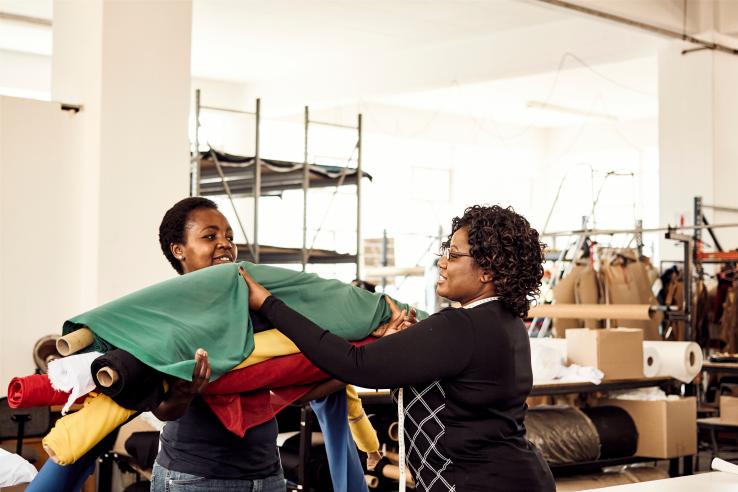
Jobs and Opportunity Initiative commits first round of funds for research on entrepreneurship and enterprise development

Covid-19 has had a dramatic and lasting impact on the micro, small, and medium enterprise (MSME) landscape worldwide, driving many to shut down or radically reshape the way they do business. The consequences of this shift extend beyond the firm to the livelihoods of its workers and their families, highlighting the vital role a firm plays in sustaining its community and providing opportunities to earn a higher income and a pathway out of poverty.
As the phrase “business as usual” loses meaning, we are grappling with new and pressing questions around what drives entrepreneurial success and job creation in a post-pandemic economy. In the recovery period, we need to understand what it takes to help entrepreneurs grow back their businesses, create more jobs in their communities, and secure their livelihoods.
To this end, in the first-ever entrepreneurship and enterprise development-focused window within the Jobs and Opportunity Initiative (JOI), we were pleased to offer funding to five promising research projects that will build the evidence base on the role of firms in job creation.
This new window expands upon our JOI research agenda, which aims to address knowledge gaps by generating evidence on skills training and job matching, broader job creation issues, and the future of jobs. JOI also aims to catalyze evidence-based policymaking that can improve employment outcomes by offering guidance for implementing organizations, governments, and donors.
As the growing body of evidence on supporting MSME owners through traditional business training increasingly points to modest impacts, more promising evidence is emerging on the positive impact of alternative business training, such as psychosocial and soft skills training, and more specialized support to high-growth-potential entrepreneurs. Through JOI, we will grow our understanding of how to improve upon, measure, and potentially scale the reach of the most promising interventions.
Growing the evidence base on the role of firms in job creation
Through JOI’s fall 2021 funded projects, we are exploring important questions around entrepreneurship and enterprise development while advancing evidence on the role of firms on job creation in sub-Saharan Africa.
Reducing social costs
For instance, the stigma and social costs associated with failure may discourage individuals, especially women and minorities, from engaging in a range of activities including entrepreneurship, job search, and migration. A pilot study from Florian Grosset in urban Cote d’Ivoire evaluates the extent to which this may hamper female entrepreneurship, and consequently labor market participation through self-employment. Researchers are testing an alternative entrepreneurship training module specifically designed to alleviate stigmas and social costs. The implementing partner in this study has an established presence in Cote d’Ivoire and is active across five countries in West Africa, positioning it well to potentially help scale up a successful pilot to a full evaluation or a regional intervention.
Addressing challenges to enterprise growth
As firms around the world emerge from the Covid-19 pandemic and the effects of government stimulus packages decrease, access to finance will be crucial to the recovery of credit constrained firms. In particular, expanding access to finance for MSMEs may spur broad-based economic growth and job creation. However, increased access to affordable credit may not be sufficient if firms also face additional challenges inhibiting their growth.
Other barriers to enterprise growth and performance include factors such as location choice, ability to grow past a certain size, and opportunities to access customers.
Two pilot studies are assessing cost-effective and potentially scalable interventions to address these challenges. In Ghana, J-PAL affiliate Morgan Hardy and coauthor Jamie McCasland are exploring the role of short-term subsidies in overcoming potential constraints that impede small garment-making firms from growing larger through potential well-matched mergers that may increase labor productivity.
Another study in Uganda by affiliate Cynthia Kinnan and coauthor Carolyn Pelnik is examining the effect of in-kind and unconditional grants in helping low-capital microentrepreneurs relocate, and how changing location may improve business performance and profitability through better market access.
What’s next?
As JOI prepares to launch its second call for proposals on entrepreneurship and enterprise development in mid-February, we are excited to add a new emphasis on the role of soft skills to complement our continued focus on scale. More details on the funding opportunity, deadlines, and eligibility can be found on our web page.
As research funded through JOI begins to yield results, we will work to integrate these insights into the broader body of evidence on effective policies to support entrepreneurs in (re)building their businesses and creating opportunity in their communities.
To learn more about this work or explore partnering with us to shape research and policies on job creation, please contact [email protected].



